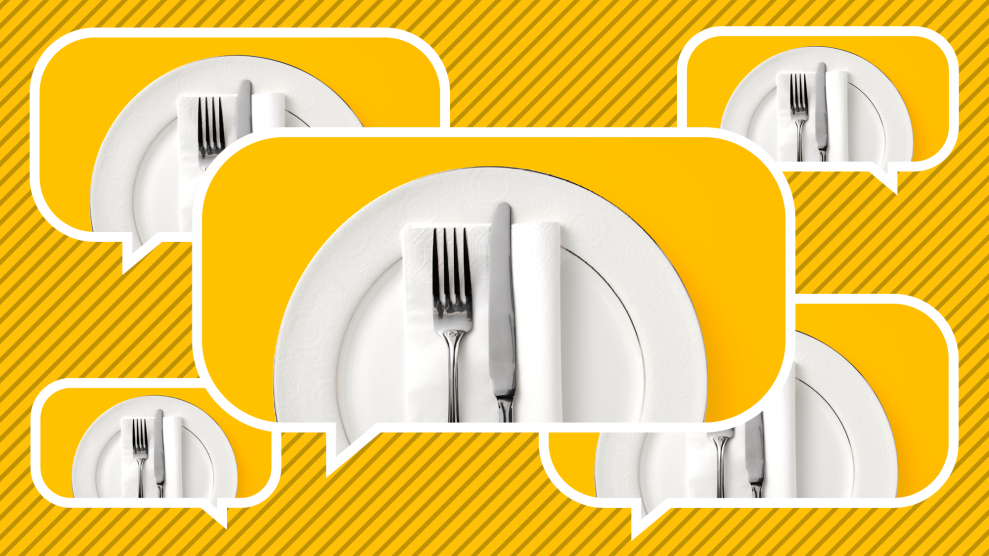
bagi1998/Getty
In recent months, accusations of sexual harassment have cropped up at major restaurants across the country. Even at eateries where high-profile chefs haven’t come under scrutiny, tipped workers often face harassment from customers—a fact we’ve been hearing more about since the #MeToo movement grabbed the national spotlight.
For the most recent episode of Bite, our food politics podcast, we asked you how #MeToo has affected your relationship with restaurants. Listen to some of the responses at the end of the episode, and read some of them below.
The responses below have been lightly edited for length and clarity.
“I was a waitress for several years in an upscale restaurant and was repeatedly harassed by customers. One middle-aged white guy grabbed my butt as I walked by his table. I told him ‘don’t touch’ and walked away. When he did the same thing again, five minutes later, I said, ‘Oh, I’m so sorry,’ turned to face him, and dumped an entire tray with 10 glasses of red wine on him. [The] manager came running over. I said that the tray ‘slipped’ because ‘someone’ grabbed my rear end. I did not get fired. These days, as a customer, I look for restaurants that hire equal numbers of male and female waitstaff, have women managers in the dining area, and do NOT make the females wear stupid, sexist outfits. I ask the women what it’s like working there. I also intervene fast, as an older female, when I see anyone hassling a waitress. I say ‘Hey, stop dissing women—that’s not okay—show some respect.’ Older women can do a great job of instant bystander intervention to help protect our young sisters in the industry.”—M. Langelan, Bethesda, Maryland
“I’m boycotting Shipley’s Donuts down here in Texas! I don’t care if it’s free, if there’s a box of kolaches sitting on the table. Even if the franchise owners are mostly separate, I will never give my money to that business again.”—Mary-Ann, Houston, Texas
“I have tipped 20 percent of the bill for decades in cash to the waitstaff regardless of service quality. They often don’t have health coverage. They have bad days, too. They are no less deserving of compassion and respect. In my youth I waited tables where drunk young men seemed to think they deserved a piece of my femaleness. I gave them prompt service, knowing not to expect a tip since I wouldn’t appease them. I would not patronize any restaurant where injustice was uncovered until there was documented change and restitution. Extend that to any business.”—Carol Odbert, Brookeville, Maryland
“I never worked in the food industry. This hasn’t prevented me from experiencing my own sexual discrimination and #MeToo moments, and I truly appreciate what women in service who struggle to make a living wage go through. I offer them a courtesy of kindness and generosity in tipping, sometimes to their surprise. I don’t think they get that often, and we owe that to people who serve and wait on us.”—Cindy Olsen, Yellow Springs, Ohio
“I was a professional cook for 10 years, and none of the revelations have been surprising to me. I’m ecstatic these stories are being told at last, though. I remember an interview I had for a line cook job once where the kitchen manager blatantly asked me if sexual harassment exists in the kitchen. By merely asking the question, he proved that not only did he know the answer was yes, but that he also knew it’s a huge problem. Of course, what he wanted to hear was ‘no,’ so that he could go on with his illusions. So, yeah, I’m really happy #MeToo is reaching restaurants now.”—Rachel, Boulder, Colorado
“I care about food, not the internal HR matters of restaurants.”—LFP, Charlottesville, Virginia
“My relationship with restaurants hasn’t changed because I don’t frequent one that’s been outed and haven’t witnessed anything untoward. I’ve always been respectful to waitstaff and other workers, so I haven’t had to change my behavior. What has changed is that I’m really disappointed in Mario Batali. He was fun to watch, and I thought he was a really nice person because of his charitable work. I’m glad that the Food Network took him off their network. When I occasionally see him now on something, all I can think is, ‘I really don’t like that guy anymore.’ Sort of ruins the whole program.”—Cris Field, Orlando, Florida

















